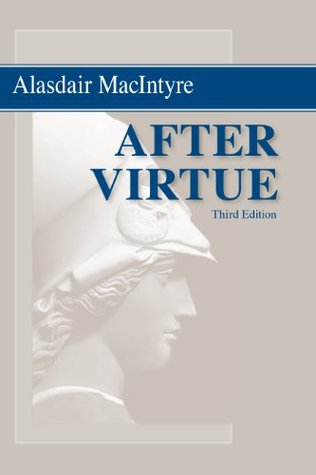More on this book
Community
Kindle Notes & Highlights
it is only possible to understand the dominant moral culture of advanced modernity adequately from a standpoint external to that culture.
And I remain equally committed to the thesis that it is only from the standpoint of a very different tradition, one whose beliefs and presuppositions were articulated in their classical form by Aristotle, that we can understand both the genesis and the predicament of moral modernity.
from the standpoint of an ongoing way of life informed by and expressed through Aristotelian concepts it is possible to understand what the predicament of moral modernity is and why the culture of moral modernity lacks the resources to proceed farther with its own moral enquiries, so that sterility and frustration are bound to afflict those unable to extricate themselves from those predicaments.
I became a Thomist after writing After Virtue in part because I became convinced that Aquinas was in some respects a better Aristotelian than Aristotle, that not only was he an excellent interpreter of Aristotle’s texts, but that he had been able to extend and deepen both Aristotle’s metaphysical and his moral enquiries.
It is only because human beings have an end towards which they are directed by reason of their specific nature, that practices, traditions, and the like are able to function as they do.
My own critique of liberalism derives from a judgment that the best type of human life, that in which the tradition of the virtues is most adequately embodied, is lived by those engaged in constructing and sustaining forms of community directed towards the shared achievement of those common goods without which the ultimate human good cannot be achieved.
Liberal political societies are characteristically committed to denying any place for a determinate conception of the human good in their public discourse, let alone allowing that their common life should be grounded in such a conception. On the dominant liberal view, government is to be neutral as between rival conceptions of the human good,
what liberalism promotes is a kind of institutional order that is inimical to the construction and sustaining of the types of communal relationship ...
This highlight has been truncated due to consecutive passage length restrictions.
conservatism is in too many ways a mirror image of the liberalism
Its commitment to a way of life structured by a free market economy is a commitment to an individualism as corrosive as that of liberalism.
we possess,
fragments of a conceptual scheme, parts which now lack those contexts from which their significance derived.
We possess indeed simulacra of morality, we continue to use many of the key expressions. But we have—very largely, if not entirely—lost our comprehension, b...
This highlight has been truncated due to consecutive passage length restrictions.
Emotivism is the doctrine that all evaluative judgments and more specifically all moral judgments are nothing but expressions of preference, expressions of attitude or feeling, insofar as they are moral or evaluative in character.
Emotivism has been presented by its most sophisticated protagonists hitherto as a theory about the meaning of the sentences which are used to make moral judgments.
C.L. Stevenson, the single most important exponent of the theory, asserted that the sentence ‘This is good’ means roughly the same as ‘I approve of this; do so as well’,
there are good reasons for distinguishing between what I called expressions of personal preference and evaluative (including moral) expressions,
the way in which utterances of the first kind depend upon who utters them to whom for any reason-giving force that they may have,
utterances of the second kind are not similarly dependent for their reason-giving force o...
This highlight has been truncated due to consecutive passage length restrictions.
Moore’s Principia Ethica
proclamation in 1903 that after many centuries he had at last solved the problems of ethics
‘good’ is the name of a simple indefinable property, a property different from that named by ‘pleasant’ or ‘conducive to evolutionary survival’ or any other natural property.
to call an action right is simply to say that of the available alternative actions it is the one which does or did as a matter of fact produce the most good.
‘personal affections and aesthetic enjoyments include all the greatest, and by far the greatest goods we can imagine…
Moore’s arguments at times are, it must seem now, obviously defective—he tries to show that ‘good’ is indefinable, for example, by relying on a bad dictionary definition of ‘definition’—and a great deal is asserted rather than argued.
genuine objective and impersonal moral standards can in some way or other be rationally justified, even if in some cultures at some stages the possibility of such rational justification is no longer available.


